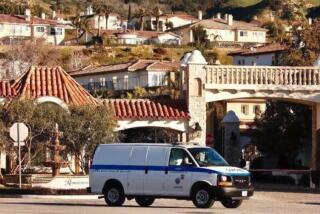Reed’s Carefree Spirit Led Him to Trouble : Captivity: ‘He had so many Lebanese friends. He thought nobody would hurt him.’
- Share via
WASHINGTON — Before Frank H. Reed was taken hostage in 1986, he enjoyed a happy life in Muslim West Beirut even as Lebanon’s civil war raged all around him.
The director of a private elementary school, Reed, then 53, was a sociable golfer who made superb chili and enjoyed entertaining, according to friends and relatives. He and his wife, Fahima, nicknamed Fifi, a 3rd-grade teacher at the same school, lived in a rooftop apartment and enjoyed the services of a cook and a driver.
Shortly before the kidnaping, their only son, Tarek, had turned 5, and the Reeds were talking about having a second child.
“He loved the climate and the people,” David Reed, a Baltimore businessman, said of his uncle. “He was able to use his talents. . . . There was a lot of opportunity for him to advance his career.”
Edward Reed, Frank’s older brother by 13 years, described Frank as a “rather happy-go-lucky kind of man. . . . He’s the type of fellow who liked to take some chances.”
That carefree spirit and love of adventure is what got him into trouble.
In the spring of 1986, Reed temporarily left his family in the Muslim quarter and moved to mostly Christian East Beirut, where there was less hostility toward Americans.
Fifi Reed, 39, said in a recent interview that she repeatedly warned her husband that there would be trouble if he ventured back to their apartment.
“But he had so many Lebanese friends,” she said. “He thought nobody would hurt him.”
So, for part of the summer of 1986, Reed moved back to the Muslim quarter. He told his wife that they should think about returning to the United States, but for the time being he wasn’t worried. No American had been taken hostage for more than a year.
Then, on the warm afternoon of Sept. 6, 1986, Reed was on his way to play golf at a country club when two gunmen intercepted his car. They pulled him and his Lebanese driver into their car and sped away. The driver was released and told Reed’s wife of her husband’s abduction.
A caller to a Western news agency claimed responsibility for the kidnaping, asserting that Reed was a CIA spy. His family denies that claim and insists that Reed had no interest in politics.
Reed was born Dec. 3, 1932, in the Boston suburb of Malden, where his father, Frank Reed Sr., owned a leather goods store and his mother taught elementary school. The young Reed was the only one among a set of triplets to survive birth.
Reed followed older brother Edward through Malden public schools and then attended the University of Maine and Northeastern University in Boston, where he earned degrees in education. He settled in Medford, Mass., but later moved with his then-wife, Nancy, and their two daughters to nearby Whitefield, N.H., where he was a school principal.
His wanderlust kept him traveling--to the North Pole, the Brazilian jungles and the Australian Outback. In Whitefield, he founded the Admiral Byrd Polar Club, which sponsored expeditions to Antarctica.
After his first marriage broke up, Reed left the Boston area. In 1977 he moved to the Middle East, where he initially traveled extensively. In letters to his family, in Massachusetts, he said his mission was to bring new teaching techniques to the Arab world.
“He wanted to train Arab children about the Western way of life,” said Edward Reed.
During an educators’ training course in Beirut, he met Fahima Dalati, a small, cheery Syrian woman known as Fifi, who was 18 years younger than he. Despite her parents’ objections, they were married in 1980; Reed, a Methodist, converted to the Muslim faith.
He worked for Beirut International College until it was destroyed in a bombing. He then founded and directed the Lebanese International School, an elementary school.
Initially estranged from his two daughters, he began corresponding with one of them, Marilyn Langston. He and Fifi even traveled to Massachusetts during vacations.
“He did come over several times,” said Marilyn Langston, 33, who has two children of her own. She said she and her father developed a “warm relationship.”
After the kidnaping, Reed’s relatives grew particularly concerned for his safety in May, 1988, when Jean-Paul Kauffmann, a French hostage who had been freed, told Fifi Reed of sharing a cell with her husband. He reportedly said Reed had been beaten, possibly because he had tried to escape.
Kauffmann told French television Monday that in captivity Reed “did not move and did not read. He was in a kind of transcendental meditation. He wanted to be left in peace, but he picked up in the last weeks we were together. . . . We became friends.”
Kauffmann told Fifi Reed that her husband had repeated one phrase over and over: “Avec de la patience, on arrive a tout” (“With patience, you can achieve anything.”).
“It’s the only French he knew, but he used to say it to me all the time whenever there was a difficulty to overcome,” she said.
After roughly 43 months in captivity, Reed, now 57, seems to have endured his ordeal and achieved what his frail, 91-year-old mother Leota Reed Sprague had so patiently prayed for.
Over the weekend, Sprague told her granddaughter that the only thing keeping her alive was the hope that, some day, she would see her son again. Now, the reunion appears to be only a few days away.
Times staff writer Marlene Cimons also contributed to this report.
More to Read
Sign up for Essential California
The most important California stories and recommendations in your inbox every morning.
You may occasionally receive promotional content from the Los Angeles Times.













